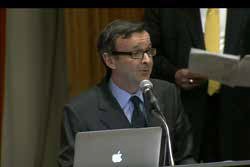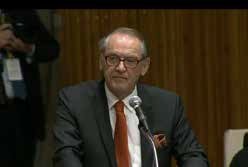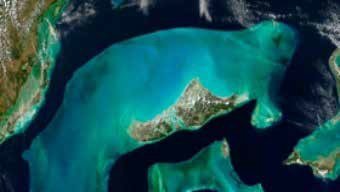The Health of the Oceans
Two speeches to the United Nations General Assembly on maintaining the health of the planet’s seas
Remarks by Ambassador Sebastiano CARDI, permanent representative of Italy to the UN

I am honored to welcome all of you to this gathering, and pleased to be among such distinguished and knowledgeable leaders.
“Alarms have been sounding over the health of the oceans and seas for years now. Indeed, many of us are already facing stark realities and the prospect of losses beyond anything imaginable just 50 years ago. The oceans and seas have been transformed from friends of humanity to almost enemies by harmful human activities such as burning fossil fuels, transporting marine species from one habitat to another, overfishing, and unsustainable and dangerous waste disposal. The ocean food chain has been disrupted, fish populations are retreating, and sea levels are rising. The oceans are becoming harbingers of devastation, danger, and loss.
“Italy is hardly immune to these effects. Surrounded by the seas, Italy has already suffered
loss and destruction from the angry response of the seas to the activities I have just listed. We are investing heavily in the future of our shores and islands through a series of efforts to fight pollution and erosion. We are establishing protected areas and sanctuaries. We are monitoring aggregations of invasive species to reduce their negative impact on marine ecosystems.
“One example. For a thousand years the city of Venice has enjoyed a productive and culturally rich life in symbiotic relationship with the sea. For Venice the sea has been both shelter and provider of material and cultural wealth. Traditionally this relationship has been depicted in art as the “marriage” between the city and the sea. But now the sea has turned into a major threat to the survival of the city and its way of life.
“Ever since the 14th century we have taken measures to safeguard and maintain the relationship of the Venetian lagoon with the sea. In recent years we have had to take major steps to protect Venice from the collective impact of human activities on the health of the sea and the surrounding land. A massive program is underway to protect and rebuild the lagoon habitats, rehabilitate polluted sites and strengthen the barrier islands and jetties. Our purpose is to make Venice live forever, happily married to the sea ……
“Venice is one battle and we will fight it valiantly. This battle has already taught us a very important lesson: the odds are enormous when we address the health of the oceans and seas. Even before a local challenge, no single community, no single country or group of countries, can go it alone. The only way to halve or reverse the damage already done is by joining forces and working together. Building on existing principles and rules of international law, such as the UN Convention on the Law of the Sea, the international community must double its efforts to protect the oceans and seas. We must develop appropriate forms of cooperation to increase sustainability in the use of their resources.
“Some industrial practices have had a devastating impact on the environment. At the same time, we must remember that technology is also a powerful tool. Combined with a new global awareness of the fragility of the oceans and seas, technology can change the world for the better.
“We are now poised to formulate the new development architecture. Therefore, we need decisive global responses in the form of global commitments. And one of these commitments must be the preservation of the capacity of the oceans and seas to guarantee the well being of the planet and its inhabitants.
“I am confident that our discussion today will have a strong impact on how we perceive the vital role that the oceans and seas have on our way of life, and guide us toward a common vision and a common path. A deeper understanding can only inspire in us a greater desire to safeguard future generations from even a partial loss of the capacity of the oceans and seas to provide for the peoples of the planet and preserve our way of life.
“Thank you.”
Remarks by UN Deputy Secretary-General Jan ELIASSON

I am pleased to have the opportunity to address you today. I commend the Governments of Italy and Palau for organizing this important event focusing on the critical issue of how to achieve healthy oceans and seas.
“As a young naval academy graduate, I learned much about the richness of, and respect for, oceans the seas. That deep bond has only grown over the years.
“There is hardly any aspect of our civilization, of our interconnected world and global economy, and of our life-supporting ecosystems, that is not in some way linked to oceans and seas.
“We depend on them for jobs in fisheries, shipping and shipbuilding, ports and tourism. They are crucial sources of food and nutrition, the primary regulator of the climate and an important sink for greenhouse gases. A very high percentage of global trade is seaborne.
“Yet despite our dependence on oceans and seas, we are not doing enough to conserve, protect and sustainably manage their resources.
“Human activity and climate change are hampering the conservation and sustainable use of oceans, seas and their related ecosystems. Some of the negative factors are overexploitation, illegal, unreported and destructive fishing practices, criminal activity, marine pollution from litter and land based sources, as well as increased sea temperatures, sea level rise and ocean acidification just to name a few.
“At the Rio+20 Conference on Sustainable Development, Member States recognized that these problems must be confronted head on. They pledged to protect and restore the health, productivity and resilience of oceans and marine ecosystems, and to maintain their biodiversity. And they set forth forwardlooking, interconnected and integrated actions in some 20 areas. These commitments represent a remarkable consensus on the way forward.
“The UN Convention on the Law of the Sea is of course a key touchstone for this work, along with other international legal instruments.
“The oceans are our common heritage and responsibility. We at the United Nations look forward to working with all stakeholders to achieve healthy oceans and sustainable development for all, recognizing that oceans and seas are critical to the development of many countries, not least small island developing States.
“The Secretary-General remains committed to supporting Member States in addressing ocean-related challenges and protecting marine biodiversity. Reaching our goals will require conservation, but also innovation, not least including through the power of technology. I look forward to the ideas that will be presented here today. I wish you a productive meeting. Thank you.”
